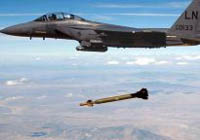Israel may strike Iranian nuclear facilities before the end of 2006
Israel may diffuse the standoff over Iran’s nuclear program by striking Iranian nuclear facilities before the year’s end. Lately the Western and Israeli military and analysts have been talking more and more about this option of last resort. A lack of progress in diplomatic efforts and Tehran’s fresh defying statements can not but make the tensions grow.

Speaking at a conference in Tehran last Friday, Iranian President Mahmoud Ahmadinejad, called Israel a “rotten, withered tree” that would be knocked down with a “single gust of wind.” The president then used less flowery language so that anyone could see the meaning of his metaphorical statement. In particular, he said that the “Zionist regime is bound for destruction.”
Israel took that statement as yet another confirmation of Iran’s aggressive intentions. Therefore, diplomatic actions could no longer keep Iran from becoming a nuclear power, say the Israelis. Former Israeli prime minister Shimon Peres made clear that “Ahmadinejad may end up like Saddam Hussein.” Meanwhile, The Jerusalem Post published an interview with a nigh-ranking officer of the Israeli military intelligence. The officer was confident that the efforts of the international community ended in failure. “The world does nothing but eats humble pie as Iran keeps spitting in its face,” he was quoted as saying. Iran says it has enriched uranium to 3.5 percent using 164 centrifuges. Iran also says that within months it will get hold of necessary technology and a thousand of centrifuges, which could make enough material for a warhead. Subsequently, Iran will reach a point of no return in terms of the nuclear program development, concluded the Israeli military intelligence officer.
In view of the above, preemptive measures are required to save the State of Israel from an Iranian nuclear attack, according to Israeli analysts. “It is inevitable that Israel will regard Iran as a country that is poised to destroy Israel unless the Iranian leadership retracts Ahmadinejad’s call for the annihilation of the State of Israel. In order to avert an armed conflict breaking out between the two nuclear powers, the Iranian nuclear threat is likely to be dealt with by a military action. It is too early to say whether the Americans and Israelis will join arms in launching a strike against or an operation will be conducted single-handedly by the Israelis. A military solution to the problem is most likely to take place before the end of the year no matter what the politicians say with respect to the situation,” said Evgeni Satanovsky, president of the Institute of the Middle East Studies in Moscow, in an interview to NG.
It is worthy of notice that at a recent conference in Moscow the representative of the Iraqi Embassy in Moscow Mehdi Imanipur maintained that the Iranian president’s statement had been misinterpreted, and he allegedly had not called for the physical destruction of Israel. According to Imanipur, Ahmedinejad was really calling for a vote involving the Arabs. A decision reached by voting will ostensibly put an end to the existence of Israel. According to Satanovsky, “Mr. Imanipur is undoubtedly a very nice fellow but his words do not mean a thing due to his status.”
Satanovsky believes analysts should pay attention to statements made by the real Iranian powers that be.
In the meantime, Iran’s influential former presidents Akbar Hashemi Rafsajani and Mohammad Hatami expressed discontent over Ahmedinejad’s attempts to highlight his role in the promotion of the Iranian nuclear program. Professor Hossein Salimi, a foreign relations specialist in Tehrain, says that the Iranian president simply aims to win more popularity by challenging the international commuinty. In the long term, his comments will be damaging for Iran’s national interests.
Analysts suppose there is still a chance for reaching a political settlement of the crisis, given the fact that even Iranian politicians publicly cast doubts on the continuing confrontation policy. Moscow has made a new attempt to find a solution to Iran’s nuclear impasse this week. A meeting of deputy foreign ministers from the U.N. Security Council’s permanent members – the United States, Britain, France, China and Russia – plus Germany opened Tuesday in Moscow. It is difficult to predict any results of the meeting. The U.S. is expected to push for targeted U.N. sanctions against Tehran while Russia and China are against military action and sanctions, they call for patience and restraint. Chief of General Staff of the Russian army Yuri Baluyevsky shared in a chorus of soothing statements by the Russian diplomats. According to him, Iran’s military preparations do not pose a threat to the southern borders of Russia.
Nezavisimaya Gazeta
Translated by Guerman Grachev
Discuss this article on Pravda.Ru English Forum
Subscribe to Pravda.Ru Telegram channel, Facebook, RSS!





